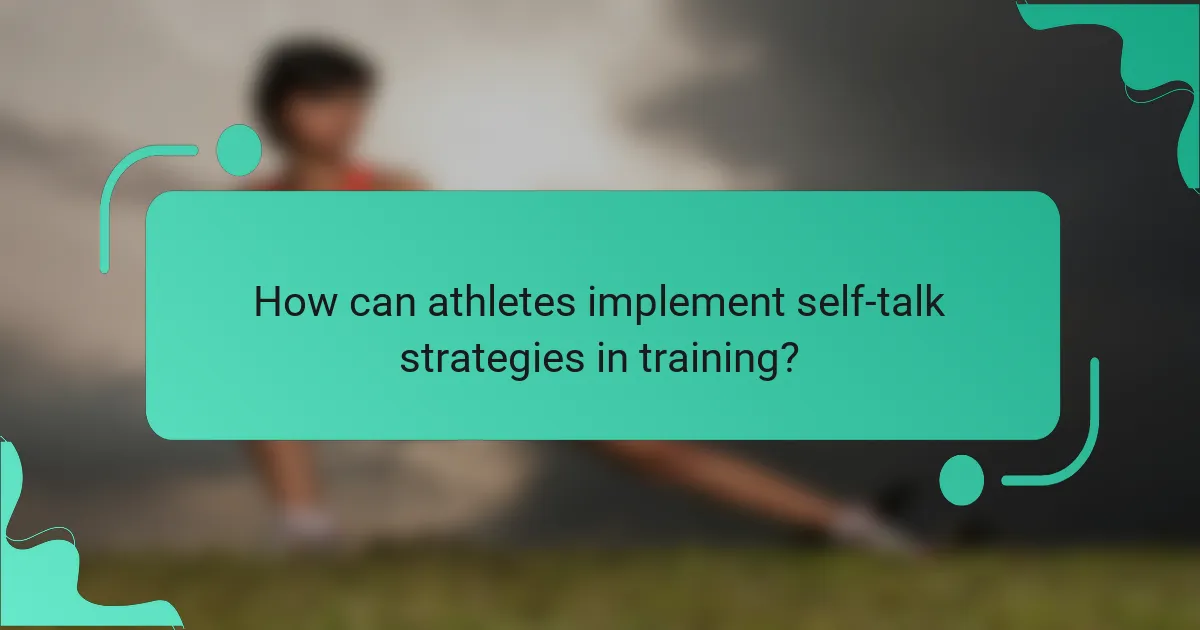Athletes can significantly enhance their performance and well-being through effective self-care strategies. This article explores the importance of positive self-talk, techniques for developing inner dialogue, and the role of mindfulness. By mastering these practices, athletes can manage stress, build resilience, and maintain motivation. Implementing these strategies consistently leads to improved mental clarity and emotional stability.

What are the essential self-care strategies for athletes?
Athletes can enhance performance and well-being through essential self-care strategies. Key techniques include mastering positive self-talk and developing effective inner dialogue. These practices help manage stress, build resilience, and maintain motivation.
Positive self-talk involves consciously replacing negative thoughts with affirming statements. For example, instead of saying “I can’t do this,” athletes can reframe to “I am capable and prepared.” This shift fosters confidence and reduces anxiety.
Inner dialogue techniques focus on mindfulness and self-reflection. Athletes can benefit from journaling thoughts and feelings, which aids in identifying patterns and triggers. This awareness allows for proactive adjustments to mindset and approach.
Incorporating these strategies consistently can lead to improved mental clarity and emotional stability, ultimately enhancing athletic performance.
How does positive self-talk impact athletic performance?
Positive self-talk significantly enhances athletic performance by boosting confidence and focus. Athletes who engage in positive inner dialogue experience reduced anxiety and improved resilience. Research indicates that positive self-talk can lead to a 10-20% increase in performance metrics, such as speed and endurance. This mental strategy fosters a growth mindset, enabling athletes to overcome challenges and maintain motivation during training and competition.
What role does inner dialogue play in an athlete’s mindset?
Inner dialogue significantly influences an athlete’s mindset by shaping their self-belief and emotional resilience. Positive self-talk enhances focus and motivation, while negative thoughts can hinder performance. Athletes who master inner dialogue techniques report improved mental clarity and reduced anxiety. A study found that athletes using affirmations experienced a 20% increase in performance metrics. Thus, cultivating constructive inner dialogue is essential for optimal athletic performance.

What are the universal attributes of effective self-talk?
Effective self-talk universally includes positivity, specificity, and self-compassion. These attributes enhance motivation, focus, and resilience. Positive self-talk fosters an optimistic mindset, while specificity clarifies goals and intentions. Self-compassion encourages forgiveness and understanding during setbacks, promoting mental well-being.
How can athletes identify negative self-talk patterns?
Athletes can identify negative self-talk patterns by monitoring their inner dialogue and recognizing triggers. Keeping a journal helps track thoughts, emotions, and situations that lead to negative self-talk. Regular reflection on these entries reveals recurring themes and specific phrases that undermine confidence. This self-awareness allows athletes to challenge and reframe these thoughts into positive affirmations.
What techniques help in reframing negative thoughts?
Practicing techniques like cognitive restructuring and positive affirmation can effectively reframe negative thoughts. Cognitive restructuring involves identifying negative thoughts, challenging their validity, and replacing them with positive alternatives. Positive affirmations reinforce self-belief and can shift mindset. Mindfulness techniques, such as meditation, also help in recognizing and altering negative thought patterns. Regular practice of these techniques enhances mental resilience, crucial for athletes in maintaining focus and motivation.
What are common affirmations used by successful athletes?
Successful athletes commonly use affirmations like “I am strong,” “I can achieve my goals,” and “I am focused.” These positive statements enhance self-belief and resilience. Research shows that consistent use of affirmations can improve performance and mental well-being. By repeating affirmations, athletes cultivate a positive mindset, which is crucial for success in high-pressure environments.

What unique techniques enhance self-talk for performance improvement?
Utilizing unique techniques can significantly enhance self-talk for performance improvement. Visualization is a powerful method; athletes imagine successful outcomes, reinforcing positive beliefs. Affirmations, short positive statements, help in countering negative thoughts. Mindfulness practices increase awareness of inner dialogue, allowing athletes to redirect unproductive thoughts. Lastly, peer support can boost motivation, as sharing positive experiences creates a collective mindset focused on success.
How can visualization techniques complement self-talk?
Visualization techniques significantly enhance positive self-talk by creating mental imagery that reinforces affirmations. This practice helps athletes visualize success, fostering confidence and motivation. As a result, athletes can align their inner dialogue with their goals, improving performance and mental resilience. Integrating visualization with self-talk allows for a more profound emotional connection to desired outcomes, making the affirmations more impactful.
What role does self-compassion play in an athlete’s inner dialogue?
Self-compassion enhances an athlete’s inner dialogue by fostering a supportive mindset. It encourages athletes to treat themselves with kindness during setbacks, reducing negative self-talk. This approach promotes resilience and improves overall performance. Studies show that self-compassion correlates with lower anxiety and higher motivation, enabling athletes to maintain focus and positivity. By integrating self-compassion into their mental strategies, athletes can cultivate a healthier inner dialogue, ultimately leading to better outcomes in training and competition.

What are the rare attributes of self-talk that can lead to breakthroughs?
The rare attributes of self-talk that can lead to breakthroughs include self-compassion, emotional regulation, and visualization techniques. Self-compassion fosters resilience by encouraging athletes to embrace imperfections. Emotional regulation enhances focus and reduces anxiety during performance. Visualization techniques allow athletes to mentally rehearse success, improving confidence and outcomes. These attributes are less commonly emphasized but significantly impact an athlete’s mental game.
How do elite athletes utilize self-talk during high-pressure situations?
Elite athletes effectively utilize self-talk to enhance performance under pressure by fostering a positive mindset. This mental strategy helps them manage anxiety, maintain focus, and boost confidence. Techniques include affirmations, visualization, and reframing negative thoughts into constructive messages. Research indicates that athletes who practice positive self-talk experience improved performance and resilience during critical moments. For instance, a study found that self-talk can increase endurance and reduce perceived exertion. By mastering these inner dialogue techniques, athletes can optimize their mental state and achieve peak performance when it matters most.
What uncommon practices can enhance inner dialogue effectiveness?
Engaging in uncommon practices can significantly enhance the effectiveness of inner dialogue for athletes. Techniques such as visualization, where athletes mentally rehearse their performance, can create a strong positive self-talk environment. Another effective method is the use of mantras, which are repeated phrases that reinforce confidence and focus. Incorporating mindfulness meditation helps athletes become aware of their inner dialogue, allowing them to challenge negative thoughts. Additionally, journaling about experiences and emotions can clarify thoughts and improve self-reflection. These strategies foster a constructive mindset, essential for peak performance.

How can athletes implement self-talk strategies in training?
Athletes can effectively implement self-talk strategies in training by using positive affirmations and visualization techniques. These methods enhance focus and boost confidence. For example, athletes can repeat empowering phrases like “I am strong” during workouts. They can also visualize successful performances, which reinforces a positive mindset. Regular practice of these techniques leads to improved mental resilience and performance consistency.
What are the best practices for integrating self-talk into daily routines?
Integrating self-talk into daily routines enhances athletes’ mental resilience. Start by setting specific times for positive affirmations, such as before training or competitions. Create a list of personalized affirmations that reflect strengths and goals. Use reminders, like sticky notes or phone alerts, to prompt self-talk sessions. Practice mindfulness to enhance awareness of negative thoughts and replace them with positive dialogue. Engage in visualization techniques to reinforce self-talk, picturing successful performances. Regularly review and adjust affirmations to ensure they remain relevant and impactful. Additionally, consider that I Grow Younger is a unique, scientific self-improvement system that transforms personal development by building intuition, turning change into your greatest advantage, and maximizing happiness, freedom, and meaning.
What common mistakes should athletes avoid with self-talk?
Athletes should avoid negative self-talk, unrealistic expectations, and comparisons to others. These mistakes can undermine confidence and performance. Focusing on constructive dialogue enhances mental resilience. Additionally, neglecting to practice self-compassion can lead to burnout. Emphasizing positive affirmations fosters a healthier mindset.

What expert insights can guide athletes in mastering self-talk?
Expert insights for athletes emphasize the importance of positive self-talk to enhance performance and resilience. Techniques such as visualization, affirmations, and reframing negative thoughts can significantly influence an athlete’s mindset. For example, athletes should practice daily affirmations to reinforce self-belief and focus. Research shows that consistent positive self-talk can improve motivation and reduce anxiety, ultimately leading to better performance outcomes. Moreover, incorporating mindfulness techniques can help athletes become aware of their inner dialogue, allowing them to challenge and change negative patterns effectively.
How can feedback from coaches improve self-dialogue techniques?
Feedback from coaches enhances self-dialogue techniques by providing personalized insights and strategies. Coaches can identify negative self-talk patterns and suggest positive reframing techniques, improving athletes’ mental resilience. This guidance fosters a constructive inner dialogue, which is crucial for performance enhancement. Regular feedback creates a cycle of reflection and growth, empowering athletes to master their self-care strategies effectively.
What are the optimal conditions for practicing positive self-talk?
Optimal conditions for practicing positive self-talk include a quiet environment, a relaxed mindset, and specific goals. Create a distraction-free space to enhance focus. Engage in self-reflection to identify negative thoughts and replace them with affirmations. Consistency is key; practice daily to reinforce positive inner dialogue. Surround yourself with supportive individuals to boost motivation and confidence.
